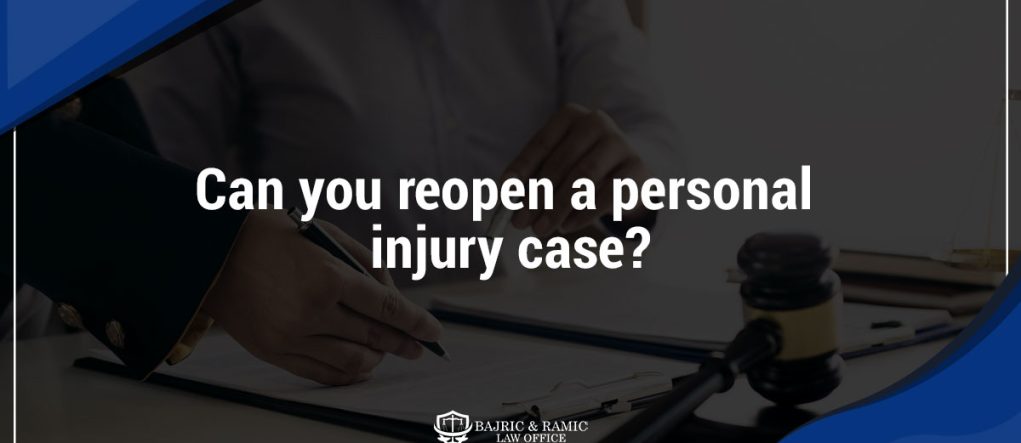Can you reopen a personal injury case?

Personal injury cases can have a significant impact on an individual’s life. And the outcome of a case can greatly affect their ability to move forward after an injury. In some cases, however, the original outcome of the case may not be satisfactory to the injured party.
In this blog post, we’ll explore whether it’s possible to reopen a personal injury case. And what circumstances might lead to doing so.
First things first
First, it’s important to understand that once a personal injury case has been settled or gone to trial. And a verdict has been reached, it is typically considered final. In general, reopening a personal injury case is not an option, except in very specific circumstances.
One such circumstance is if new evidence comes to light that could significantly impact the outcome of the case. This might include evidence that was not available or known at the time of the original trial or settlement. Such as newly discovered medical records or witness testimony.

Another circumstance
Another circumstance that could lead to reopening a personal injury case. Is if there was an error in the legal process. This might include a mistake made by the judge or jury. Or if the defendant or their legal team engaged in fraudulent behavior or misconduct during the trial.
It’s worth noting that simply being dissatisfied with the outcome of a personal injury case is not a sufficient reason to reopen the case.
Personal injury cases can be emotionally charged, and it’s understandable to want a different outcome. However, reopening a case requires a strong legal argument based on new evidence or an error in the legal process.
If you believe you have new evidence or that an error was made in your personal injury case. It’s important to consult with a qualified personal injury lawyer who can review the facts of your case. And help you determine whether reopening your case is an option. A personal injury lawyer can also help you understand the legal requirements for reopening a case. And the potential risks and benefits of doing so.
How can you reopen the injury case?
Reopening a personal injury case is not an easy task. And it is generally not possible unless certain conditions are met.
The following are the situations in which a personal injury case can be reopened:
New Evidence
The discovery of new evidence that was not available during the original case can be grounds for reopening a personal injury case. This could be medical evidence that was not previously available. Witness statements that were not previously known, or any other information that could significantly impact the outcome of the case.
Legal Error
If there was an error in the legal process during the original case, this could be grounds for reopening it. For example, if the judge made a mistake in the legal proceedings or if there was a breach of legal ethics by one of the parties involved in the case.
Fraud or Misconduct
If the defendant or their legal team engaged in fraudulent behavior or misconduct during the trial, this could be grounds for reopening the case.
If any of these situations occur, it is essential to work with an experienced personal injury lawyer to help you reopen your case.
The following are the steps to take to reopen a personal injury case:
- Consultation: You should consult with a personal injury lawyer who can help you determine whether there are grounds for reopening your case. The lawyer will review the details of the original case and advise you on whether there is a legal basis for reopening it.
- Investigation: If there is a basis for reopening your case, your lawyer will investigate the new evidence or legal error that has come to light. This may involve gathering new medical records, witness statements, or other evidence.
- Filing a Motion: If your lawyer determines that there is sufficient evidence to reopen the case, they will file a motion with the court requesting that the case be reopened.
- Hearing: The court will review the motion and hold a hearing to determine whether the case should be reopened. At the hearing, your lawyer will present the new evidence or legal error that has been discovered.
- Trial: If the court grants your motion to reopen the case, the case will be retried. This may involve going through the entire trial process again or simply presenting the new evidence to the court for a ruling.
Reopening a personal injury case is not an easy process and can only be done under certain circumstances
If you believe that you have new evidence or there was a legal error during your case, it is essential to consult with an experienced personal injury lawyer who can guide you through the process of reopening your case.
Your case generally can be solved in two ways. Through a settlement with your insurance company and the at-fault party’s insurance company, or with a verdict by a judge or jury. How long does a personal injury lawsuit take?
By following the above steps and working with a skilled personal injury lawyer, you may be able to achieve a more favorable outcome in your case.
Nedim Ramic and Bajric & Ramic team of attorneys are here for you. And you should not hesitate to call us today for a free consultation. The time is of the esence. If you find these information above useful, but you have more questions regarding the subject. Or you just need legal help straight forward, give us a call. On 314-352-6800 and get free consultations today!


